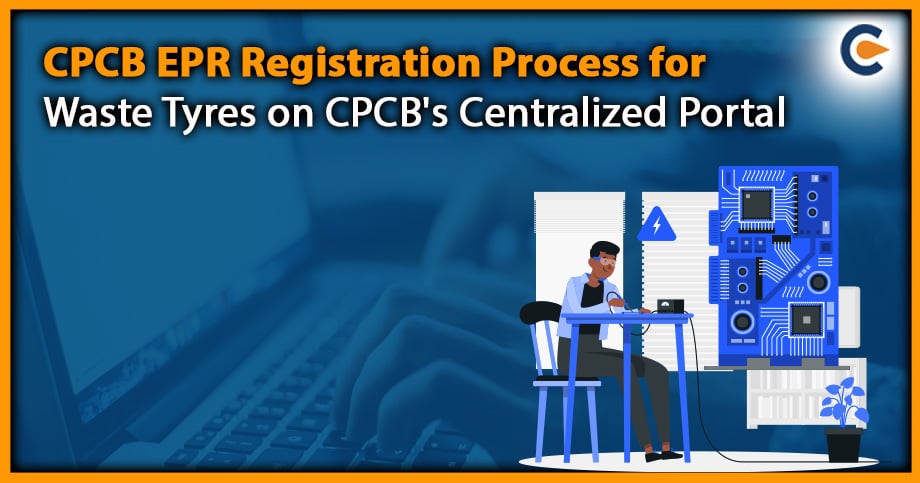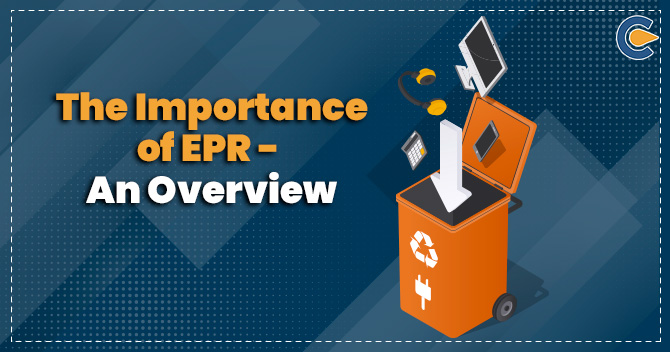The main objective of the CPCB EPR Registration Process for Waste Tyres is to reduce the amount of discarded tyres in the environment, which offers several benefits to manufacturers, importers, brand owners, and tyre waste processors, such as pollution prevention. The Ministry of Environment, Forest, and Climate Change of the Government of India issued a draft notification on Extended Producer Responsibility for Waste Tyre in the Gazette of India on December 31, 2021, under notification number S.O. 5497 (E). This regulation mandates that tyre manufacturers take responsibility for managing waste tyres in an environmentally friendly manner by implementing necessary measures to prevent any adverse effects on the environment or human health.
CPCB EPR Registration Process for Waste Tyres
The registration for waste tyres on the CPCBs centralized portal is as follows:
- Access the portal and apply for login credentials by submitting an application form.
- Login to the portal using the received credentials.
- Fill in the online registration form with the required information, including applicant details, activity details, and proposed EPR plan.
- Attach all necessary documents, such as proof of ownership, EPR plan details, and any other relevant information.
- Submit the completed online application form along with the required documents within 30 days.
- The CPCB will review the application and issue a registration number within 15 days.
- Authorized personnel must comply with all EPR regulations and submit regular reports on waste tyre management activities to the CPCB.
- If the application is approved, an EPR authorization certificate will be issued, valid for two years.
The Below Image Is A Representation of the Procedure for EPR.


Documents Required For CPCB EPR Registration Process for Waste Tyres
The following are the documents that may be required for the EPR registration process from CPCB for Waste Tyre Management:
- Pan card of the company – to verify the company’s legal identity.
- GST number of the company – to verify the tax registration status of the company.
- IEC number of the company (in case of import) – to comply with import-export regulations if the company is involved in the import of waste tyres.
- CIN number of the company – to verify the company’s registration details with the Ministry of Corporate Affairs.
- Aadhar number of the authorized person – to verify the identity of the person responsible for waste tyre management activities.
- Covering letter – as per Annexure A provided in the official Instruction Sheet.
- Undertaking – as per Annexure B provided in the official Instruction Sheet.
- Tyre Composition – as per Annexure C provided in the official Instruction Sheet.
- Submission of Plant-wise manufacturing Data – as per Annexure D provided in the official Instruction Sheet.
The applicant must also submit other relevant documents, such as:
- Proof of ownership or lease of the premises where waste tyre management activities will occur.
- Details of the proposed EPR plan, including collection, storage, transportation, processing, and disposal of waste tyres.
- Environmental clearances or NOCs from the relevant authorities.
Requirements of the CPCB EPR Registration Process for Waste Tyres
The requirements for the EPR registration process from CPCB for Waste Tyre Management are as follows:
- Registration of Entity: All entities must register on the portal created by the Central Pollution Control Board[1] (CPCB) before starting or continuing their business activities.
- EPR Process: The EPR obligations
established under the Amendment Rules have been divided into categories based
on the entity’s registration on the CPCB portal, as follows:
- The EPR requirements for the year 2022-23 are 35% of the quantity of newly manufactured or imported tyres in 2020-21.
- The EPR requirements for 2023-24 are 70% of the quantity of newly manufactured or imported tyres in 2020-21.
- The EPR requirements for 2024-25 are 100% of the quantity of newly manufactured or imported tyres in 2020-21.
- After 2024-25, the EPR requirements for newly manufactured or imported tyres will be 100%.
- Units established after April 1, 2022, must fulfil their EPR obligations two years after establishment, requiring 100% of the quantity of newly manufactured or imported tyres.
- Importers of waste tyres in a year will have to fulfil their EPR obligation for 100% of the imported tyres.
The EPR Certificate Transaction Process Involves The Following Rules:
- A producer can purchase EPR certificates only up to their current year’s EPR obligation, plus any past-year liabilities, plus 10% of the current year’s liability.
- Producers must acquire the required EPR certificates quarterly to fulfil their EPR registration obligations.
- Once a producer obtains an EPR certificate, it is adjusted automatically against their liability. The certificate is cancelled and extinguished after it is adjusted, with priority given to earlier liabilities.
- Producers and recyclers must maintain a record of all EPR certificate transactions and include them in their quarterly returns, which must be submitted through the portal. Top of Form
Note: On the portal, details regarding the EPR certificate, including availability, prerequisites, and other pertinent information, for each manufacturer or recycler, should be publicly accessible.
Producers’ Responsibility:
- To fulfil their licensing obligations for EPR in Tire Waste Recycling, producers buy EPR certificates from registered recyclers.
- Producers must submit annual and quarterly reports in the specified formats on the portal to the Central Pollution Control Board by the end of the month following the quarter to which the report pertains. All registered companies must submit the quarterly report.
Recyclers Responsibility:
- Every month, the recycler must provide data to the portal on the quantity of used and generated waste tyres, EPR certificates sold, and other pertinent information.
- Using the form given on the portal, the recycler must submit annual and quarterly reports by the end of the month after the quarter to which the return pertains.
Benefits of CPCB EPR Registration Process for Waste Tyres
The advantages of EPR extend beyond simply obtaining certification or seeking EPR certificates for waste tires/rubber.
- EPR can help to minimize the use of other waste management methods, such as burial or incineration.
- EPR can reduce the financial and physical burden on local municipalities to manage waste.
- EPR ensures proper recycling and refurbishment of products and parts, promoting resource conservation.
- EPR encourages easier and quicker disassembly of products, leading to more efficient resource recovery.
- EPR helps to decrease the amount of waste generated overall.
Conclusion
The new amendment, introduced by the Ministry of Environment, Forest, and Climate Change, outlines the provisions for utilising and managing waste tyres. The amendment became effective on July 21, 2022, and requires entities to register on the portal developed by the Central Pollution Control Board before commencing or continuing their business activities. The EPR obligation has been bifurcated based on the entity’s registration on the CPCB portal, and entities must submit reports and keep records of transactions related to EPR certificates. The benefits of EPR for waste tyres include reducing reliance on other waste disposal methods, reducing the burden on local municipalities, ensuring proper recycling and refurbishment of products and their parts, encouraging conservation of natural resources, and decreasing the amount of waste generated.
Read Our Article: How To Obtain CPCB EPR Registration?










